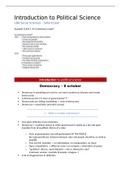Introduction to Political Science
1BA Social Sciences – Sofia Erzeel
Example CLASS 2 Is Liberland a state?
Is Liberland a state?
NO • Not recognized by other states
• It has no people
• No external sovernithy
• Doesn’t has it own territory
• No cultural entitie`
• Not much in common
• No common history
YES
• They get applications
• Tentity (not bound)
• No clear territory (disputed) –
Is Liberland a nation?
• They share a believe
• Skeptic liberty NO
Introduction to political science
Democracy – 8 october
Democracy is something we root for, we want countries to become and remain
democracies
Is democracy the n°1 form of governement???
Democracies are failing, backsliding -> crisis of democracy
Democracy = essentially contested concept
1. What is or makes a democracy?
Very basic definition (core elements)
Democracy = a political system in which government is based on a fair and open
mandate from all qualified citizens of a state
o Form of government, but self-government BY THE PEOPLE
(by representatives), distance between ruler and people should be as small as
possible
o Free and fair mandate -> no intimidation, no manipulation, no fraud
o Open competitions -> different actors can compete + alternation of power
o “qualified” citizens: much debated -> who is allowed to vote?
(criminals, women, mentally ill people, refugees…)
A lot of disagreement of definition
, o Procedural VS Substantive definition
Procedural -> look at procedures that sustain a democracy, how is it
organized? = MOST WORKED WITH!
THIN definitions: can citizens participate in political life
THICK definitions: say previous is not enough, also offer rights
and liberties to people*
Substantive -> look at content and outcome of democracy. What do
procedures result in? (equality, government for the people, equality)
= hard to measure LESS WORKED WITH
*Example on thick understanding, POLIARCHY – Robert Dahl
Democracy is to difficult to explain for science -> talks about polyarchy (perfect
democracy) = constitutional + participation pilar
o 7 characteristics:
Elected officials control government and policy
Free and fair elections
PARTICIPATION
Inclusive voting rights
Right to run for office
Freedom of speech/expression
CONSTITUTIONAL Citizens have access to alternative sources of information
Freedom of association
Defenition develops constantly!
2. What forms does a democracy take?
DIRECT VS INDIRECT
DIRECT democracy
o Political decisions are taken directly by the citizens
o Model of Athenian democracy = citizens directly ruled polis
o !!! Hard to implement because of scale !!!
o Contemporary forms:
-Referendums: people vote directly on a political issue (eg. Brexit)
-E-democracy: people express themselves via the internet
Eg. Ostbelgien : establishes citizen council, randomly selected, can give recommendations to
parliament
Why choose direct democracy?
o All people are involved, ideal of selfrule,
REPRESENTATIVE democracy
o Decisions are taken indirectly by the people:
o People choose representatives who take decisions on their behalf
o Effective link between representatives and the people is crucial -> elections
offer this link
o Way to organize democracy on a large scale
, Why choose representative?
o Realistic for scale,
o Participants are focused on being elected again, self interest
LIBERAL VS ILLIBERAL
LIBERAL democraties
o Liberal democracies = political rights + constitutional protection of individual
rights and liberties
o Government by the people and by law
ILLIBERAL democraties
o Restrictions on freedom of speech, etc…
o Illiberal democracies = political rights BUT Restrictions on individual rights and
civil liberties
o Forms of socio-economic and political oppression
Are illiberal democraties on the rise again?
Victor Orbam (Hungary) wants an illiberal democraties, says rights have gone to far
Radical right and far right parlements are gaining votes, tend to merge with illiberal
democracy view
Want to limit liberal political institutions, eg. Press, media.., limiting minority rights
What is NOT a democracy?
Democratically disguised dictatorships
o Claim to use elections and democratic institutions
BUT: elections are not ‘free and fair’ -> not democratic
o Vote manipulation, voter intimidation, election fraud
o Non-competitive or semi-competitive elections
3. What are the raquisites for a sustainable democracy
Modernization,
o Socio-economic development supports democracy (urbanized, good
education, industrial society… reinforce democracy)
Softens class struggle: fewer demands for non-democratic alternatives
Less corruption
Rise of middle class: political moderation
Education: knowledge and democratic values
o Yet… Economic development is no guarantee for
democracy (increasing wealth is often not well distributed) eg. China is super
rich but it is not a democracy.
, Political institutions
o Democratic stability depends on quality of democratic institutions (e.g. strong
constitutions) (institutions that are fit for society)
Political culture
o Democratic stability depends on existence of a political culture that supports
it (you need a certain culture, to sustain democracy, some cultures aren’t fit
for it)
4. Is there a global spread on democracy?
3 waves of democratization in recent history (S. Huntington 1991)
Wave= group of countries that transition to democracy in a certain timeframe
Shape of wave!!! Some countries are transitioning but some are falling back
o 1st wave: 1826-1930: Western Europe & North America
(caused by industry, education, wealth…)
o 2nd wave: WWII-1970: Germany, Japan, India, Israel, Austria, Italy,
decolonization processes
o 3rd wave: 1974-??: Southern Europe, democratic transitions in Latin America,
Asia Pacific (S.-Korea, Taiwan), and Eastern Europe
UPWARDS CURVE = does this mean that everyone is becoming a democracy, is it the
final form of governance??? THE END OF HISTORY?
Map shows there is no further growth in democracies, even small regression and
some countries regress to non free scenario
5. What challanges democracy?
What are the syptoms of decreasing democracy?
a. Decreasing trust in politics




